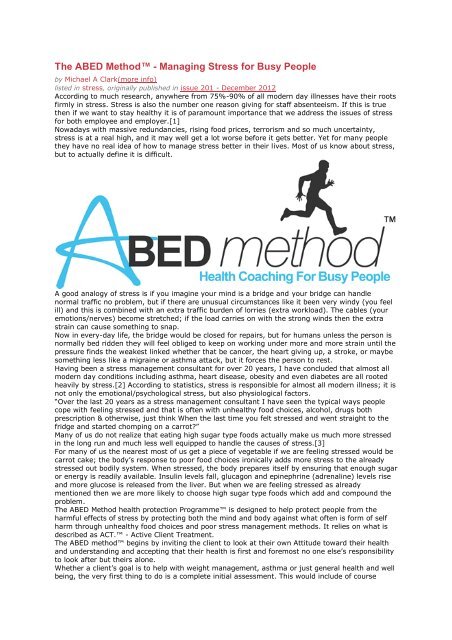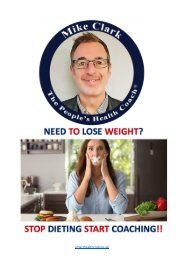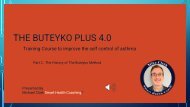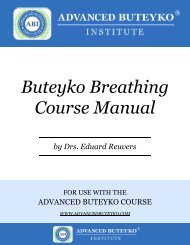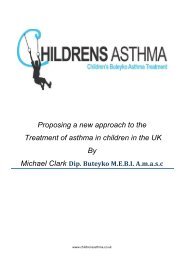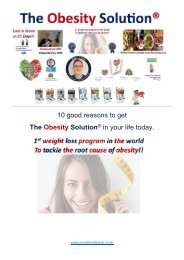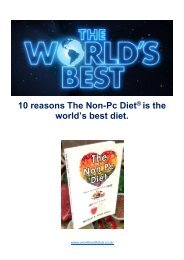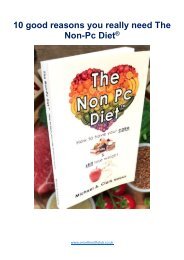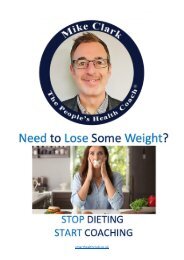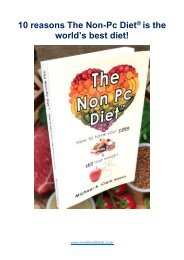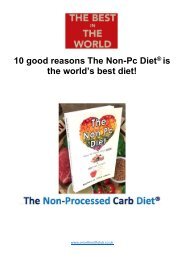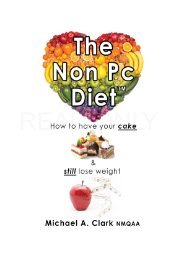The ABED Method®-managing stress
Create successful ePaper yourself
Turn your PDF publications into a flip-book with our unique Google optimized e-Paper software.
<strong>The</strong> <strong>ABED</strong> Method - Managing Stress for Busy People<br />
by Michael A Clark(more info)<br />
listed in <strong>stress</strong>, originally published in issue 201 - December 2012<br />
According to much research, anywhere from 75%-90% of all modern day illnesses have their roots<br />
firmly in <strong>stress</strong>. Stress is also the number one reason giving for staff absenteeism. If this is true<br />
then if we want to stay healthy it is of paramount importance that we address the issues of <strong>stress</strong><br />
for both employee and employer.[1]<br />
Nowadays with massive redundancies, rising food prices, terrorism and so much uncertainty,<br />
<strong>stress</strong> is at a real high, and it may well get a lot worse before it gets better. Yet for many people<br />
they have no real idea of how to manage <strong>stress</strong> better in their lives. Most of us know about <strong>stress</strong>,<br />
but to actually define it is difficult.<br />
A good analogy of <strong>stress</strong> is if you imagine your mind is a bridge and your bridge can handle<br />
normal traffic no problem, but if there are unusual circumstances like it been very windy (you feel<br />
ill) and this is combined with an extra traffic burden of lorries (extra workload). <strong>The</strong> cables (your<br />
emotions/nerves) become stretched; if the load carries on with the strong winds then the extra<br />
strain can cause something to snap.<br />
Now in every-day life, the bridge would be closed for repairs, but for humans unless the person is<br />
normally bed ridden they will feel obliged to keep on working under more and more strain until the<br />
pressure finds the weakest linked whether that be cancer, the heart giving up, a stroke, or maybe<br />
something less like a migraine or asthma attack, but it forces the person to rest.<br />
Having been a <strong>stress</strong> management consultant for over 20 years, I have concluded that almost all<br />
modern day conditions including asthma, heart disease, obesity and even diabetes are all rooted<br />
heavily by <strong>stress</strong>.[2] According to statistics, <strong>stress</strong> is responsible for almost all modern illness; it is<br />
not only the emotional/psychological <strong>stress</strong>, but also physiological factors.<br />
“Over the last 20 years as a <strong>stress</strong> management consultant I have seen the typical ways people<br />
cope with feeling <strong>stress</strong>ed and that is often with unhealthy food choices, alcohol, drugs both<br />
prescription & otherwise, just think When the last time you felt <strong>stress</strong>ed and went straight to the<br />
fridge and started chomping on a carrot?”<br />
Many of us do not realize that eating high sugar type foods actually make us much more <strong>stress</strong>ed<br />
in the long run and much less well equipped to handle the causes of <strong>stress</strong>.[3]<br />
For many of us the nearest most of us get a piece of vegetable if we are feeling <strong>stress</strong>ed would be<br />
carrot cake; the body’s response to poor food choices ironically adds more <strong>stress</strong> to the already<br />
<strong>stress</strong>ed out bodily system. When <strong>stress</strong>ed, the body prepares itself by ensuring that enough sugar<br />
or energy is readily available. Insulin levels fall, glucagon and epinephrine (adrenaline) levels rise<br />
and more glucose is released from the liver. But when we are feeling <strong>stress</strong>ed as already<br />
mentioned then we are more likely to choose high sugar type foods which add and compound the<br />
problem.<br />
<strong>The</strong> <strong>ABED</strong> Method health protection Programme is designed to help protect people from the<br />
harmful effects of <strong>stress</strong> by protecting both the mind and body against what often is form of self<br />
harm through unhealthy food choices and poor <strong>stress</strong> management methods. It relies on what is<br />
described as ACT. - Active Client Treatment.<br />
<strong>The</strong> <strong>ABED</strong> method begins by inviting the client to look at their own Attitude toward their health<br />
and understanding and accepting that their health is first and foremost no one else’s responsibility<br />
to look after but theirs alone.<br />
Whether a client’s goal is to help with weight management, asthma or just general health and well<br />
being, the very first thing to do is a complete initial assessment. This would include of course
asking the client why they want to lose weight, but also includes an ‘Individual Emotional Stress<br />
Test’. This is because <strong>stress</strong> plays such a huge role either directly or indirectly that to ignore it<br />
would be foolish. <strong>The</strong> <strong>stress</strong> test takes a around 10 minutes and the results are almost<br />
instantaneous.<br />
<strong>The</strong>n follows a discussion about what the client feels might be causing emotional and psychological<br />
<strong>stress</strong> in their lives, so that they can begin to separate the <strong>stress</strong>es into different categories. For<br />
example, the <strong>stress</strong> of working at a job you do not like is different to the <strong>stress</strong> caused by<br />
something like debts you may be ignoring. So the categories are <strong>stress</strong> that can be dealt with<br />
quickly as opposed to those that needs longer to sort out.<br />
Are Your Needs Truly Being Met?<br />
Image of Maslow’s Hierarchy of Needs<br />
Often a large cause of <strong>stress</strong> is based upon our belief system that we are intrinsically just not good<br />
enough; we must ‘do’ something to be recognized and strive to better than our peers, but at what<br />
cost to our health?<br />
We are taught from an early age how the world works, and how our role is in that world. We are<br />
taught we have the freedom to be whoever we want to be. But that freedom is at a price; for<br />
many people it is all they ever think about, earning more and more money, or the thought of<br />
money, or the thought of the next dress or for some the thought of where the money to pay the<br />
next bill is coming from; money is the false prophet (profit).<br />
For instance more families than ever before have both parents working full time often this means a<br />
bigger house and a newer car, but in reality and ultimately is it a new car you really want or do<br />
you really want to be happy?<br />
By helping the client separate the causes of <strong>stress</strong> in their lives into those that the client can effect<br />
with immediate action to those that may take longer to those over which they have no control, for<br />
instance a loved one who has a drink or drug problem.<br />
Clients are also encouraged to use proven <strong>stress</strong> busting methods such as listening to calming<br />
music in the car and not the radio. He also might recommend listening to the 20 Minutes <strong>ABED</strong><br />
Mind Spa <strong>ABED</strong> Fitness and Relaxation Yoga. This yoga audio is not religious nor does it<br />
involve any ridiculous stretches; it is based upon the theory that emotional pain can contribute<br />
toward physical pain; therefore by releasing physical pain you can also help relieve emotional pain.<br />
<strong>The</strong> <strong>ABED</strong> Yoga easy to use, the audio is excellent for this and research does seem to back up<br />
this claim.[4]
Setting boundaries is important, clients are encouraged to really view their home as their castle,<br />
as a bastion away from the madness of the outside world, a place where the family can feel safe.<br />
This includes self imposed boundaries on when work is finished and is left and the home is made<br />
as a haven of peace.<br />
<strong>The</strong> healing power of love and family is not to be underestimated in effective <strong>stress</strong> management.<br />
(see number 3 on Maslow’s Hierarchy of Needs)<br />
When attitude assessment is completed, the 2nd Stage of the <strong>ABED</strong> Method commences which<br />
is breathing. I am a classically trained Buteyko Breathing Specialist; the only UK Professional<br />
Stress Management Specialist who also trained at the Buteyko Natural Breathing Clinic in Moscow,<br />
having received personal instruction from the late Professor Buteyko in person.<br />
Breathing<br />
When you consider that there are over 5 million adults in the UK and 1 in 3 adults in the UK have<br />
higher than optimum blood pressure, if by just relaxing the breathing and reducing tension can<br />
have such positive effects and all without the aid of expensive drugs, then especially taking into<br />
account today’s tough economic climate this has to be something to be looked at more closely.<br />
Graph showing how breathing rate can positively affect Blood Pressure<br />
<strong>The</strong> Breathing Normalization principle is that by normalizing the breathing the body chemistry<br />
allows healing to begin. <strong>The</strong> retraining involves nasal breathing, abdominal breathing (apparently<br />
this helps facilitate the switching off of the <strong>stress</strong> response), reducing the volume of breathing<br />
especially when at rest, say whilst at work (apparently may of us over breathe unknowingly due to<br />
the brain perceiving threats of ‘deadlines’, but the body experiences this as a physical threat which<br />
leads to an increase of breathing, which in the long term can be detrimental to health.[7]<br />
We can now talk about the ‘E’ in the <strong>ABED</strong> Method which stands for Exercise. According to<br />
research we are on average between 3-5 times less physically active then we were 50 years ago<br />
yet the percentage of high sugar, high fat processed foods has increased dramatically. This<br />
combination of low physical activity, combined with the increased consumption of high sugar high<br />
fat foods is a major reason why obesity and diabetes are set to explode to epidemic levels in the<br />
next 3-5 years.<br />
Things could be dramatically different if more people realized that how little exercise they had to<br />
do to lose weight and become healthy; in fact as little as 60 minutes per week could be enough as<br />
long as you followed a certain exercise regime and principle. In the author’s recent book <strong>The</strong> Art of<br />
Exercise Michael explains that by far and away the number one reason people give for not taking
enough exercise is the simple fact they do not have the time.[5] <strong>The</strong> research suggests that<br />
physical fitness training leads to improved mood, self-concept, and work behaviour.<br />
This is not a problem with <strong>ABED</strong> Method Exercise. <strong>The</strong> exercises in this programme are based<br />
upon the same principles covered by a UK programme by the documentary<br />
programme Horizon shown on BBC television earlier this year.<br />
Clients are encouraged to invest in a simple heart rate monitor for their home use, and they are<br />
encouraged to exercise 3 times per week. <strong>The</strong> beauty of the <strong>ABED</strong> Method exercise programme<br />
is that all of the exercises can be done in the client’s home, they can be done in a gym but this is<br />
not a requirement. This has to be a significant advantage to many exercises that require gyms,<br />
because again if we go back to the first point as to why people do not exercise is because they do<br />
not have the time.<br />
<strong>The</strong> exercises in his programme use a special scientifically proven technique called ‘High Intensity<br />
Variable Training’ which can be as much as 6 times as effective as normal basic cardio exercise<br />
such as jogging. This is also much healthier because there is much less impact on the joints.[8]<br />
Finally we cover ‘D’ for diet; the vast majority of people in the UK have no real idea of how much<br />
<strong>stress</strong> they are loading onto their bodies by including such a high percentage of poor quality<br />
refined processed foods in their diet. This is another form of ‘<strong>stress</strong>’ but physical <strong>stress</strong> on the<br />
body. An example would be the damaging effect on the west by the vast amounts of white bread,<br />
pasta and rice that is consumed as opposed to brown. In fact, just by changing to brown you can<br />
cut diabetes by up to 70% by reducing the <strong>stress</strong> on the pancreas because brown rice, bread and<br />
pasta takes longer to turn to sugar in the body and so do not create the same spike or sugar load<br />
as the white far less nutritious choices.[9]<br />
Michael has recently come across cases where 100% of foods in some people’s diets are actually<br />
processed! (Cooking is also included as process this means that only raw food such as fruit and<br />
salads basically what he describes as ‘live’ food.) Eating live food is of particular benefit for <strong>stress</strong><br />
reduction due to the prevalence of enzymes, which are in all foods in their natural uncooked state<br />
and are required for us to utilize the nutrients from food. Enzymes are completely destroyed<br />
during cooking, and this means that in order for us to obtain the nutrients the body has to make<br />
its own nutrients from its own resources. <strong>The</strong> only way to do this is by actually breaking down<br />
parts of our own organs!<br />
We are born with a natural reserve of enzymes; the older we get the lower enzyme count we have<br />
in the blood and urine. So the greater the percentage of cooked food in our diets the quicker we<br />
age![6]<br />
<strong>The</strong> <strong>ABED</strong> Method also adheres strongly to benefits of correct food combining. <strong>The</strong>re are sound<br />
physiological reasons for eating foods in compatible combinations. In other words, some foods, if<br />
mixed in the digestive system, will cause di<strong>stress</strong>! <strong>The</strong> following explanation is taken from the<br />
expert Natural Hygienist Dr Herbert M Shelton.<br />
<strong>The</strong> principles of food combining are dictated by digestive chemistry. Different foods are digested<br />
differently...<br />
• Starchy foods like potatoes, pasta and bread require an alkaline digestive medium which is<br />
supplied initially in the mouth by the enzyme ptyalin;<br />
• Protein foods require an acid medium for digestion- hydrochloric acid.<br />
As any student of chemistry will assure you, acids and bases (alkalis) neutralize each other. If you<br />
eat a starch with a protein, digestion is impaired or completely arrested![10] <strong>The</strong> undigested food<br />
mass can cause various kinds of digestive disorders. Undigested food becomes soil for bacteria<br />
which ferment and decompose this food. Its by-products are poisonous, one of which, alcohol, is a<br />
narcotic that destroys or inhibits nerve function.<br />
It plays havoc with nerves of the digestive tract, suspending their vital action such that<br />
constipation may well be a result! <strong>The</strong>re are 9 simple rules to help with digestion, weight<br />
management and health. <strong>The</strong>se are all explained and covered in the <strong>ABED</strong> Method healthy eating<br />
programme.<br />
<strong>The</strong> <strong>ABED</strong> Method Diet is not a diet as in the normal losing weight short term kind of diet, but<br />
instead a healthy eating plan for life. Michael calls is the 80-20 plan: people may eat 80%<br />
healthily, including whole foods, quality meat and fish (not processed meats) and 20% they can let<br />
themselves go. Interestingly, many clients report after only a few weeks on the programme that<br />
the old cravings for sweet stuff are not as intense.
References<br />
1. Louise Peacock. Stress-overtakes-cancer-as-main-cause-of-sickness-absence.<br />
Available: http://www.telegraph.co.uk/finance/jobs/8806473/Stress-overtakes-cancer-as-maincause-of-sickness-absence.html<br />
. Last accessed 10/02/12. 2011.<br />
2. Louise Chang MD. 10-fixable-<strong>stress</strong>-related-health-problems.<br />
Available: http://www.webmd.com/balance/<strong>stress</strong>-management/features/10-fixable-<strong>stress</strong>related-health-problems<br />
. Last accessed 10/10/11. 2011.<br />
3. Kristina Heritage. study-links-sugar-intake-to-<strong>stress</strong>-.<br />
Available: http://www.usforacle.com/study-links-sugar-intake-to-<strong>stress</strong>-1.2144586#.UHV75i7A-<br />
69 . Last accessed 10/10/12. 2010.<br />
4. Gina Orlando. Researchers Find Yoga Helps Ease Stress Related Medical and Psychological<br />
Conditions. Available: http://www.bu.edu/news/2012/03/07/researchers-find-yoga-helps-ease<strong>stress</strong>-related-medical-and-psychological-conditions/<br />
. Last accessed 08/10/10. 2012.<br />
5. Michael A Clark <strong>The</strong> Art of Exercise. Kingston Upon Hull: <strong>The</strong> Well Naturally Publishing<br />
House. 27-31. 2011.<br />
6. Michael A Clark <strong>The</strong> Art of Diet. Kingston Upon Hull: <strong>The</strong> Well Naturally Publishing House.<br />
106-111. 2011.<br />
7. Michael A Clark <strong>The</strong> Art of Breathing. Kingston Upon Hull: <strong>The</strong> Well Naturally Publishing<br />
House. 105-112. 2011.<br />
8. Michael A Clark <strong>The</strong> Art of Exercise. Kingston Upon Hull: <strong>The</strong> Well Naturally Publishing<br />
House. 68-72. 2011.<br />
9. G Yang Department of Medicine. Prospective study of dietary carbohydrates, glycemic<br />
index, glycemic load, and incidence of type 2 diabetes mellitus in middle-aged Chinese<br />
women. www.ncbi.nlm.nih.gov. 167(21) (3), 27-32. 2007.<br />
10. Michael A Clark <strong>The</strong> Art of Diet. Kingston Upon Hull: <strong>The</strong> Well Naturally Publishing House.<br />
68-72. 2011.


